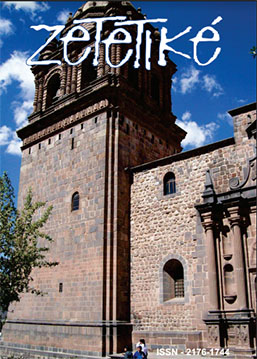Abstract
This paper aims at describing some results of a study about intuitive ideas of independence of pupils attending the 9th grade. In the study participated 310 pupils of the 9th grade, who answered a questionnaire with several tasks on conditional probability and independence. In this paper we explore just the two tasks that involve independence. In general, the results show that students have intuitive ideas about the concept of independence in the contexts studied.References
AHLGREN, A.; GARFIELD, J. Analysis of the Probability Curriculum. In: KAPADIA, R.;BOROVCNIK, M. G. (Ed.). Chance encounters: probability in education. Dordrecht, The Netherlands: Kluwer Academic Publishers, 1991. p. 107-134.
BOROVCNIK, M. G.; KAPADIA, R. Research and developments in probability education internationally. In: JOUBERT, M.; ANDREWS, P. (Ed.). Proceedings of the British Congress for Mathematics Education. 2010. p. 41-48. Disponível em http://www.bsrlm.org.uk/IPs/ip30-1/BSRLM-IP-30-1-06.pdf. Acesso em: 12 fev. 2012.
BOROVCNIK, M.; PEARD, R. Probability. In: BISHOP, A. J. et al. (Ed.). International handbook of mathematics education. Dordrecht: Kluwer Academic Publishers, 1996. p. 239-287.
FALK, R.; FALK, R.; LEVIN, I. A potential for learning probability in young children. Educational Studies in Mathematics,Dordrecht, v. 11, p. 181-204, 1980.
FERNANDES, J. A. Concepções erradas na aprendizagem de conceitos probabilísticos. Dissertação (Mestrado em Informática no Ensino) – Universidade do Minho, Braga, Portugal, 1990.
FERNANDES, J. A. Intuições e aprendizagem de probabilidades: uma proposta de ensino de probabilidades no 9o ano de escolaridade. Tese (Doutorado em Metodologia do Ensino da Matemática) – Universidade do Minho, Braga, Portugal, 1999.
FISCHBEIN, E. The intuitive sources of probabilistic thinking in children. Dordrecht: D. Reidel, 1975.
FISCHBEIN, E; NELLO, M. S.; MARINO, M. S. Factors affecting probabilistic judgments in children and adolescents. Educational Studies in Mathematics, Dordrecht, v. 22, p. 523-549, 1980.
FISCHBEIN, E.; SCHNARCH, D. The evolution with age of probabilistic intuitively based misconceptions. Journal for Research in Mathematics Education, Reston, v. 28, n. 1, p. 96-105, 1997.
GAL, I. Towards “probability literacy” for all citizens: building blocks and instructional dilemas. In: JONES, G. (Ed.). Exploring probability in schools: challenges for teaching and learning. New York, NY: Springer, 2005. p. 39-63.
GARFIELD, J.; AHLGREN, A. Difficulties in learning basic concepts in probability and statistics: Implications for research. Journal for Research in Mathematics Education, Reston, v. 19, n. 1, p. 44-63, 1988.
GREEN, D. R. A survey of probability concepts in 3000 pupils aged 11-16 years. In: GREY, D. R.et al. (Ed.). Proceedings of the First International Conference on Teaching Statistics. Sheffield, UK: Teaching Statistics Trust, 1983. p. 766-783.
HAWKINS, A.; JOLLIFFE, F.; GLICKMAN, L. Teaching Statistical Concepts. Harlow, UK: Longman, 1992.
JONES, G. A. et al. Students’ probabilistic thinking in instruction. Journal for Research in Mathematics Education,Reston, v. 30, n. 5, p. 487-519, 1999.
KAHNEMAN, D.; TVERSKY, A. Subjective probability: A judgment of representativeness. In: KAHNEMAN, D.; SLOVIC, P.; TVERSKY, A. (Ed.). Judgment under uncertainty: Heuristics and biases. Cambridge: Cambridge University Press, 1982. p. 32-47.
KELLY, I. W.; ZWIERS, F. W. Mutually exclusive and independence: Unravelling basic misconceptions in probability theory. In: DAVIDSON, R.; SWIFT, J. (Ed.). The Proceedings of the Second International Conference on Teaching Statistics. Victoria B.C.: University of Victoria, 1988.
KONOLD, C. et al. Inconsistencies in students’ reasoning about probability. Journal for Research in Mathematics Education, Reston, VA, v. 24, n. 5, p. 392-414, 1993.
LECOUTRE, M.; DURAND, J. Jugements probabilistes et modèles cognitifs: étude d’une situation aléatoire. Educational Studies in Mathematics, Dordrecht, v. 19, n. 3, p. 357-368, 1988.
NCTM. Principios y Estándares para la Educación Matemática. Sevilla: Sociedad Andaluza de Educación Matemática Thales, 2003.
PORTUGAL. Ministério da Educação. Programa ajustado de Matemática do ensino básico. Lisboa: Ministério da Educação, 2007.
SHAUGHNESSY, J. M. Research in probability and statistics: Reflections and directions. In: GROUWS, D. A. (Ed.). Handbook of research on mathematics teaching and learning. New York: Macmillan, 1992. p. 465-494.
STAVY, R.; TIROSH, D. How studentes (mis-)understand science and mathematics: intuitive rules. New York: Teachers College Press, 2000.
TARR, J. E. Using middle school students’ thinking in conditional probability and independence to inform instruction. (Doctoral dissertation, Illinois State University, 1997). Dissertation Abstracts International – University Microfilms International (UMI) ProQuest, Ann Arbor,n. 49, Z5055, 1997.
TARR, J. E.; JONES, G. A. A framework for assessing middle school students’ thinking in conditional probability and independence. Mathematics Education Research Journal, Dordrecht, v. 9, n. 1, p. 39-59, 1997.
TARR, J. E.; LANNIN, J. K. How can teachers build notions of conditional probability and independence? In: JONES, G. A. (Ed.). Exploring probability in school: challenges for teaching and learning. New York, NY: Springer, 2005. p. 215-238.
WATSON, J. M. Conditional probability: its place in the mathematics curriculum. Mathematics Teacher, Reston, v. 88, n. 1, p. 12-17, 1995.
WATSON, J. M. The probabilistic reasoning of middle school students. In: JONES, G. A. (Ed.). Exploring probability in school: Challenges for teaching and learning. New York, NY: Springer, 2005. p. 145-169.

This work is licensed under a Creative Commons Attribution-NonCommercial-NoDerivatives 4.0 International License.
Copyright (c) 2014 Zetetiké: Revista de Educação Matemática

